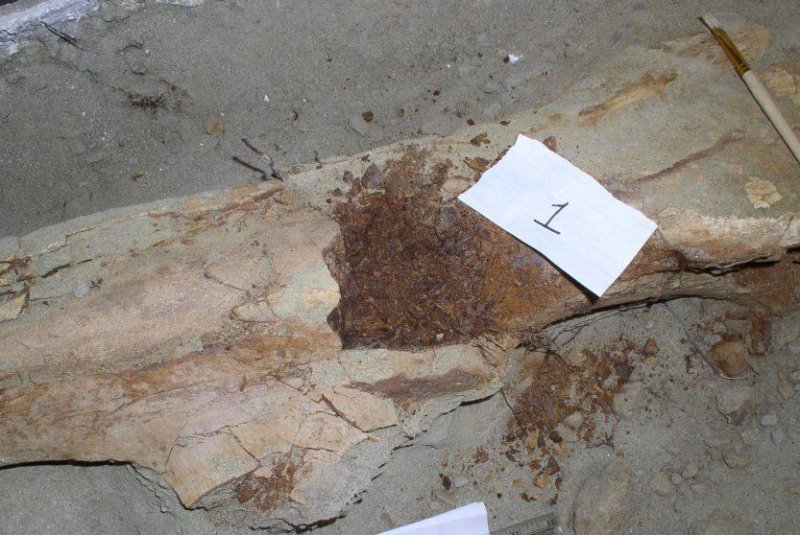New research has confirmed the presence of preserved collagen in an ancient dinosaur femur bone. Photo by Mary Schweitzer/N.C. State
Jan. 23 (UPI) -- Researchers have isolated 80 million-year-old collagen peptides in the lab. The collagens were found in fossilized tissue attached to the femur of a Brachylophosaurus canadensis, a type of mid-sized hadrosaur.
The discovery -- detailed in the Journal of Proteome -- offers further proof that organic molecules can be safely preserved for millions of years more than previously predicted.
Scientists first announced the discovery of ancient dinosaur collagen in 2009. Since then, chemical and molecular analysis techniques have become even more sophisticated and precise. Recently, researchers resampled the femur.
"Mass spectrometry technology and protein databases have improved since the first findings were published, and we wanted to not only address questions concerning the original findings, but also demonstrate that it is possible to repeatedly obtain informative peptide sequences from ancient fossils," Elena Schroeter, a postdoctoral researcher at North Carolina State University, said in a news release.
Lab analysis revealed eight peptide sequences of collagen I, including two identical to the sequences recovered in 2009. The latest analysis revealed six new sequences.
"We are confident that the results we obtained are not contamination and that this collagen is original to the specimen," Schroeter said. "Not only did we replicate part of the 2009 results, thanks to improved methods and technology we did it with a smaller sample and over a shorter period of time."
Researchers hope their findings will inspire an improved understanding of the dinosaur's evolution and shed light on its relationship with modern animals. Scientists also hope to explore what exactly allows collagen to remain preserved for millions of years.
"Our purpose here is to build a solid scientific foundation for other scientists to use to ask larger questions of the fossil record," concluded Mary Schweitzer, professor of biological sciences. "We've shown that it is possible for these molecules to preserve. Now, we can ask questions that go beyond dinosaur characteristics. For example, other researchers in other disciplines may find that asking why they preserve is important."















